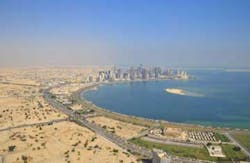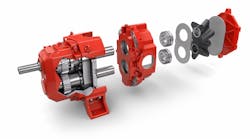Qatar is planning to strengthen its position in the petrochemical market by increasing its petrochemical output to 23 million tons a year by 2020, according to the country's minister of energy and industry Muhammad Saleh Al-Sada.
According to Al-Sada, Qatar's economic growth will continue to rely mostly on hydrocarbon resources in the near future and this is the main reason why the country is radically expanding its refining and processing industry. The speech of Qatar's energy and industry minister was read at the MEED Qatar Projects 2013 Conference on his behalf by Hamad Rashed Al-Mohannadi, deputy board chairman of Qatar Petroleum.
Al-Sada also said that the global economy is still facing an uncertain future as many developed economies, especially in Europe, are still in the grip of difficult economic and financial conditions. While the state of Qatar is not protected from potential turmoil, it has managed to go through the global financial crisis largely unaffected, thanks to its strong liquefied natural gas (LNG) sector. In 2011 oil and LNG exports accounted for half of Qatar's GDP and 70 percent of its budget revenues, he pointed out.
RELATED: LNG key to supplying Asia Pacific energy needs
The expansion of petrochemical output will mostly focus on the downstream sector, as a means to achieve greater diversification. As production expands, so will exports and the domestic petrochemical sector is going to play an increasingly important role in the economy, Al-Sada pointed out.
Thanks to "continued impressive growth" in revenues generated from hydrocarbons, Qatar has reached a new level in its economic development. The state has re-invested much of these revenues back into the economy and has created a solid base upon which other sectors can also grow. By increasing output capacity and creating a favorable business environment to attract more private investors, the economy can be diversified and this is a top priority for the country, Al-Sada went on.
Meanwhile, Qatar has also launched a large-scale investment program that will see billions of dollars poured into key infrastructure projects, including the Hamad International Airport, scheduled to be opened in April, the New Harbor, due to be in action in 2016, and extensive development of sports facilities before the FIFA World Cup 2022, which will be held in Qatar.
All these projects have been facilitated by an ongoing course of liberalizing the business environment and introducing new, more investment-friendly laws that attract private capital into the domestic economy. In turn, this leads to a more competitive market, better value to clients and reduced processing costs. Qatar is proud of the progress it has made to promote microeconomic and macroeconomic development, the minister stated.
According to the Global Competitive Index, Qatar occupied 11th position in 2011, moving up three places from the previous year. This ranks it as the most competitive economy in the Middle East, scoring higher than any other country in the region.


